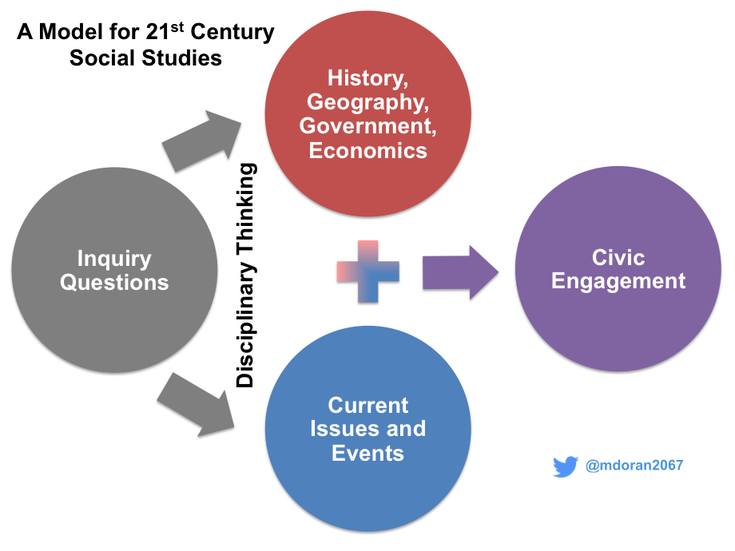Reflections and Collections for the 21st Century Social Studies Classroom
|
by Matt Doran
Why Study Philosophy? What course would you add to enrich the high school experience for the 21st century? Engineering? Computer Science? Coding? How about philosophy? Yes, philosophy. Learners in the 21st century need the sound reasoning and thinking skills offered by this classical discipline. Even if not offered as a separate course, the study of philosophy woven throughout and across disciplines offers great potential for deepening high school education. The term philosophy means "love of wisdom." As a discipline in the humanities, philosophy offers similar benefits to the traditional subjects of English and history--to deepen and broaden our understanding of the human experience, and in turn, to make us better humans and better citizens. Indeed, many of the essential questions we use to frame English and history courses are philosophical in nature. These questions require us to draw logical deductions, solve ethical dilemmas, and make aesthetic judgments. Philosophy introduces us to the various worldviews that shape human actions across the world. Political philosophy helps us understand the intellectual underpinnings of governments and ideology. These understandings allow us to better engage in meaningful civic dialogue and take informed action. Of course, these are just the philosophical reasons for studying philosophy. Most of us will need practical justifications. (How does this help our students on the test?) Here we can turn to the sub-field of logic. In all disciplines, students are expected to evaluate and construct sound arguments using claims, evidence, and reasoning (warrants). Understanding how to construct logical syllogisms, and avoid logical fallacies, is particularly important in the use of reasoning. Reasoning uses rules of logic to show why the facts and data presented count as evidence. Consider the sampling of standards below drawn from the core academic disciplines to illustrate the importance of logic. English Language Arts (Common Core State Standards)
History (National Center for History in the Schools)
Math (Common Core State Standards Mathematical Processes)
Science (Next Generation Science Standards, Understandings about the Nature of Science)
Resources for Getting Started with Philosophy
For Further Reading Barry Beyer, "What Philosophy Offers to the Teaching of Thinking." Michael Shammas, "For a Better Society, Teach Philosophy in High Schools." By Matt Doran Skills: What should students be able to do? Apply disciplinary thinking skills to text sets to show the relationship among social studies content, current events, and civic engagement. The use of text sets supports infusion of the Common Core Literacy in History/Social Studies standards, and holds great potential for creating a 21st century social studies classroom. A text set is a collection of readings organized around a common theme or line of inquiry. The anchor text is the focus of a close reading. Supporting texts are connected meaningfully to the anchor text and to each other to deepen student understanding of the anchor text. In social studies, close reading of content texts is not an end in itself, but rather a means to creating successful citizens. In this model, anchor texts can be pulled from rich collections of primary and secondary sources. Supporting texts from current events show the enduring relevance of the themes and questions raised in these readings from history, geography, and government and economics. Applying the tools of disciplinary thinking and common core literacy standards across the text sets prepares students to engage in meaningful civic discourse and take informed action. Here is one example of an inquiry-based text set unit: Course Overarching Essential Question
Unit Compelling Question
Supporting Questions
Text Set Anchor
Supporting
For a complete text lesson, with anticipation guide, adapted readings, and close reading questions, download the resources from this page on Share My Lesson (free account required). |
Blog Categories
All
Blog Archives
August 2020
|

 RSS Feed
RSS Feed

11/23/2015
0 Comments